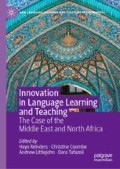Abstract
In this auto-ethnography, the author describes her efforts during more than a decade to introduce computer-assisted language learning (CALL) in Iran. She recounts the steps taken, the blunders made and the lessons learned, as well as the challenges and opportunities that she faced, and the successes and failures that shaped this venture. It is hoped that sharing this experience will provide encouragement to people in similar circumstances, and assist them in implementing their plans with less effort and higher quality.
Access this chapter
Tax calculation will be finalised at checkout
Purchases are for personal use only
References
Chenoweth, N. A., Jones, C. M., & Tucker, G. R. (2006). Language online: Principles of design and methods of assessment. In R. P. Donaldson & M. A. Haggstrom (Eds.), Changing language education through CALL (pp. 147–168). New York: Routledge.
Cope, B., & Kalantzis, M. (2009). “Multiliteracies”: New literacies, new learning. Pedagogies: An International Journal, 4(3), 164–195.
Dakers, J. R. (Ed.). (2006). Defining technological literacy: Towards an epistemological framework. New York: Palgrave Macmillan.
Gee, J. P. (2015). The new literacy studies. In J. Rowsell & K. Pahl (Eds.), The Routledge handbook of literacy studies (pp. 35–48). London/New York: Routledge.
Healey, D. (1999). Classroom practice: Communicative skill-building tasks in CALL environments. In J. Egbert & E. Hanson-Smith (Eds.), CALL environments: Research, practice, and critical issues (pp. 116–136). Alexandria, VA: TESOL.
Healey, D. (2007). Theory and research: Autonomy and language learning. In J. Egbert & E. Hanson-Smith (Eds.), CALL environments: Research, practice, and critical issues (2nd ed., pp. 377–388). Alexandria, VA: TESOL.
Kasper, L. F. (2000). New technologies, new literacies: Focus discipline research and ESL learning communities. Language Learning and Technology, 4(2), 105–128.
Kessler, G. (2006). Assessing CALL teacher training: What are we doing and what could we do better? In P. Hubbard & M. Levy (Eds.), Teacher education in CALL (pp. 23–42). Philadelphia, PA: John Benjamins.
Krotoski, A. (2013). Untangling the Web: What the internet is doing to you. London: Faber and Faber/Guardian Books.
Lehman, R. M., & Conceição, S. C. O. (2010). Creating a sense of presence in online teaching: How to “be there” for distance learners. San Francisco, CA: Jossey-Bass.
Marandi, S. S. (2002). Teaching English in the new millennium: CALL in Iran. In A. A. Rezaei (Ed.), Proceedings of the First Conference on Issues in English Language Teaching in Iran (pp. 205–220). Tehran, Iran: University of Tehran Press.
Marandi, S. S. (2010). Bravely stepping forward: Creating CALL communities to support teachers and learners in Iran. In J. Egbert (Ed.), CALICO monograph series 9: CALL in limited technology contexts (pp. 179–188). San Marcos, TX: CALICO.
Marandi, S. S. (2013). Computer-assisted language learning. In R. Akbari & C. Coombe (Eds.), Middle East handbook of applied linguistics (pp. 185–208). Dubai, United Arab Emirates: TESOL Arabia.
Marandi, S. S. (2017). Virtual walls and bans: e-Learning/CALL hegemonies in the Iranian context. In J. Colpaert, A. Aerts, R. Kern, & M. Kaiser (Eds.), CALL in context: Proceedings (pp. 488–495). Berkeley: University of California.
Marandi, S. S., Karimi Alavijeh, K., & Nami, F. (2015). Layers of CALL hegemonies: An Iranian experience. In F. Helm, L. Bradley, M. Guarda, & S. Thouësny (Eds.), Critical CALL—Proceedings of the 2015 EUROCALL Conference, Padova, Italy (pp. 386–391). Dublin: Research-publishing.net.
Mishra, P., & Koehler, M. J. (2006). Technological pedagogical content knowledge: A framework for teacher knowledge. Teacher College Record, 108(6), 1017–1054.
New London Group. (1996). A pedagogy of multiliteracies: Designing social futures. Harvard Educational Review, 66(1), 60–92. Retrieved September 29, 2017, from http://newarcproject.pbworks.com/f/Pedagogy%2Bof%2BMultiliteracies_New%2BLondon%2BGroup.pdf.
Palloff, R. M., & Pratt, K. (2005). Collaborating online: Learning together in society. San Fransisco, CA: Jossey-Bass.
Prensky, M. (2001). Digital natives, digital immigrants. Retrieved September 29, 2017, from http://www.albertomattiacci.it/docs/did/Digital_Natives_Digital_Immigrants.pdf.
Razak, R. A., Kaur, D., Halili, S. H., & Ramlan, Z. (2016). Flipped ESL teacher professional development: Embracing change to remain relevant. Teaching English with Technology, 16(3), 85–102.
Silviyanti, T. M., & Yusuf, Y. Q. (2015). EFL teachers’ perceptions on using ICT in their teaching: To use or to reject? Teaching English with Technology, 15(4), 29–43.
Snyder, I. (2002). Silicon literacies. In I. Snyder (Ed.), Silicon literacies: Communication, innovation and education in the Electronic Age (pp. 3–12). London: Routledge.
Warschauer, M. (1999). Electronic literacies: Language, culture, and power in online education. Mahwah, NJ: Lawrence Erlbaum.
Zeng, G. (2017). Collaborative dialogue in synchronous computer-mediated communication and face-to-face communication. ReCALL, 29(3), 257–275.
Author information
Authors and Affiliations
Corresponding author
Editor information
Editors and Affiliations
Rights and permissions
Copyright information
© 2019 The Author(s)
About this chapter
Cite this chapter
Marandi, S.S. (2019). Preparing for a Digital Future: CALL Teacher Education in Iran. In: Reinders, H., Coombe, C., Littlejohn, A., Tafazoli, D. (eds) Innovation in Language Learning and Teaching. New Language Learning and Teaching Environments. Palgrave Macmillan, Cham. https://doi.org/10.1007/978-3-030-13413-6_11
Download citation
DOI: https://doi.org/10.1007/978-3-030-13413-6_11
Published:
Publisher Name: Palgrave Macmillan, Cham
Print ISBN: 978-3-030-13412-9
Online ISBN: 978-3-030-13413-6
eBook Packages: Social SciencesSocial Sciences (R0)

